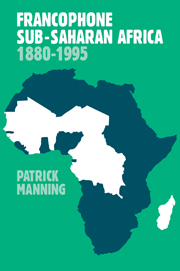Book contents
- Frontmatter
- Contents
- List of illustrations
- Acknowledgments
- Note on the second edition
- Map 1 Francophone sub-Saharan Africa in 1995
- 1 Prologue
- 2 Economy and society, 1880–1940
- 3 Government and politics, 1880–1940
- 4 Culture and religion, 1880–1940
- 5 Economy and society, 1940–1985
- 6 Government and politics, 1940–1985
- 7 Culture and religion, 1940–1985
- 8 Democracy and dependence, 1985–1995
- 9 Epilogue
- Bibliographical essay
- Index
6 - Government and politics, 1940–1985
Published online by Cambridge University Press: 12 January 2010
- Frontmatter
- Contents
- List of illustrations
- Acknowledgments
- Note on the second edition
- Map 1 Francophone sub-Saharan Africa in 1995
- 1 Prologue
- 2 Economy and society, 1880–1940
- 3 Government and politics, 1880–1940
- 4 Culture and religion, 1880–1940
- 5 Economy and society, 1940–1985
- 6 Government and politics, 1940–1985
- 7 Culture and religion, 1940–1985
- 8 Democracy and dependence, 1985–1995
- 9 Epilogue
- Bibliographical essay
- Index
Summary
By the end of the 1930s, the colonial system of absolute rule had imposed itself forcefully on African peoples. But then, after the cataclysm of World War II, a great modification of the political system of francophone Africa took place. The transformation took place because of pressures from the African subjects, from the world outside the French and Belgian empires, and from critics of colonial rule in the metropoles. As a result, the political system rapidly changed from one based on authoritarian rule to one based on European parliamentary democracy. With that new political structure came an emphasis on nationalism and nation-building in Africa. Nationalism and democracy led to independence: the re-emergence of African sovereignty. But with African sovereignty, politics were no longer constrained within the limits of European structures, be they authoritarian or parliamentary. African politics re-emerged, now at the national level.
Democratization and independence brought much wider political participation in African countries, but they also brought many unresolved conflicts to the surface. The need for solidarity and the fear of outside interference caused many francophone governments to limit politics to a single party. In some cases democracy itself was an early casualty, as military dictators or civilian autocrats took advantage of social conflicts to seize power.
Among the major, unresolved problems in African government were the choice between dictatorship and democracy in political process, and between civilian and military leadership at the national level. In domestic policy, African nations had to choose between industrial and agricultural development, and between free-market capitalist or state-directed socialist economic policy. In social policy, they chose between advancing the standing of an elite and improving the conditions of the masses.
- Type
- Chapter
- Information
- Francophone Sub-Saharan Africa 1880–1995 , pp. 133 - 160Publisher: Cambridge University PressPrint publication year: 1999



